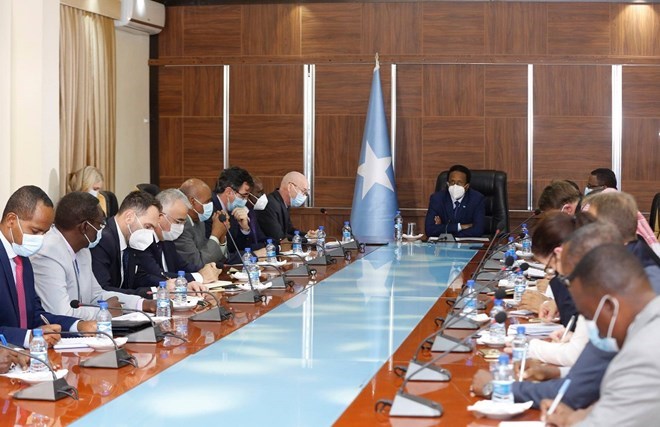
Saturday April 17, 2021

FILE PHOTO
Mogadishu (HOL) - The embattled President of Somalia, Mohamed Abdullahi Farmajo, met with members of the international community on Saturday.
In attendance were the Deputy Special Representative to the UN and Ambassadors from the EU, AU, UK and US.
Diplomatic sources told HOL that the international community reiterated its position to the Somali government that an extension was highly counter-productive. They added that it would not support a pathway to elections outside of the Sep 17 agreement, which enjoys broad political consensus. The conversation was centred on resuming dialogue with the Federal Member States.
They also explained to Farmajo how their bilateral relationship could change in light of the extension.
The Somali government is heavily reliant on international aid and received US$ 1.9 billion in official development assistance in 2019 that was almost equal parts humanitarian (US$ 934 million) and development aid (US$ 924 million).
The World Bank, United Kingdom, European Union and Germany were the most significant contributors to development aid in 2019, providing more than 50% of total development aid (approximately US$ 500 million). The United States provided nearly half of all humanitarian assistance in 2019 (US$ 455 million).
The meeting would be the first since Farmajo's administration was roundly criticized by the international community this week after the Lower House of Parliament pushed through a two-year extension in a hastily organized session. The Upper House rejected the proposal outright and sent it back to the Lower House, but President Farmajo decided to sign the act into law. Farmajo said that the decision would lead Somalia to a popular election. Still, his detractors say that he sang a similar tune at the beginning of his four-year term in 2017 but has since only made attempts to centralize power.
Somalia's Ministry of Foreign Affairs shot back, saying that the government will not tolerate threats or interference from outside forces on internal matters.
"Inflammatory statements laden with threats, which undermine the political independence and sovereign rights of national institutions, will only serve to embolden terrorist organizations and anti-peace elements in Somalia."
On Thursday, Somalia's Foreign Affairs State Minister, Balal Mohamed Osman, met with the Russian ambassador to Somalia and Djibouti, Mikhail Golovanov, amid a growing rift between the Horn of Africa nation and prominent Western bakers. The visit was viewed as the federal government doubling down its decision to extend its mandate and show its Western allies that it could also look East and forge new relationships.
The extension has exasperated an already fragile political situation and threatens to divide Somalia's security sector under clan lines.